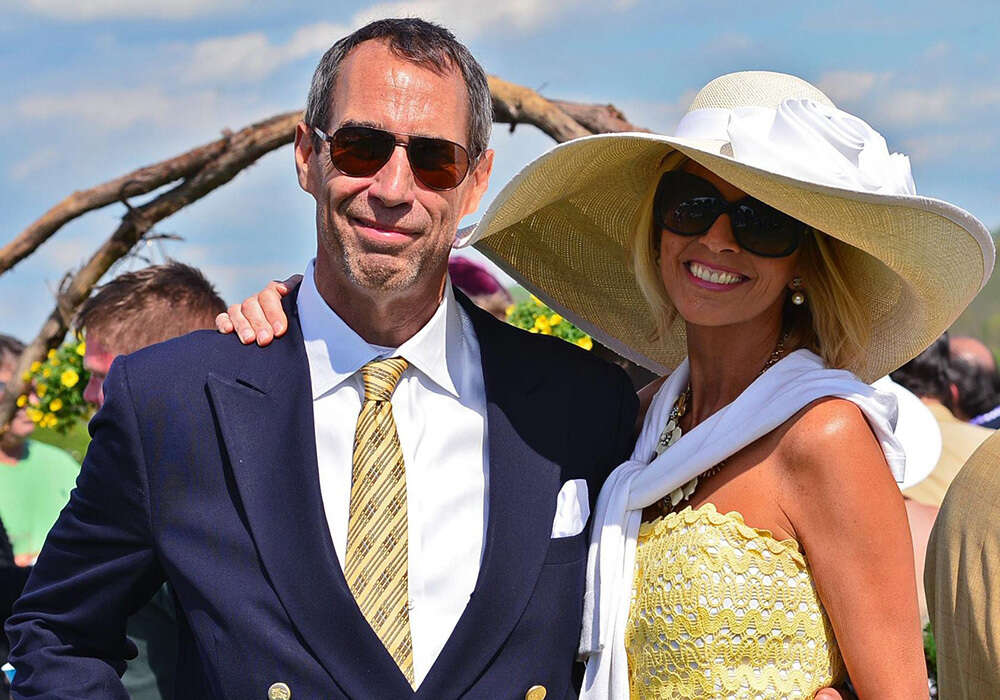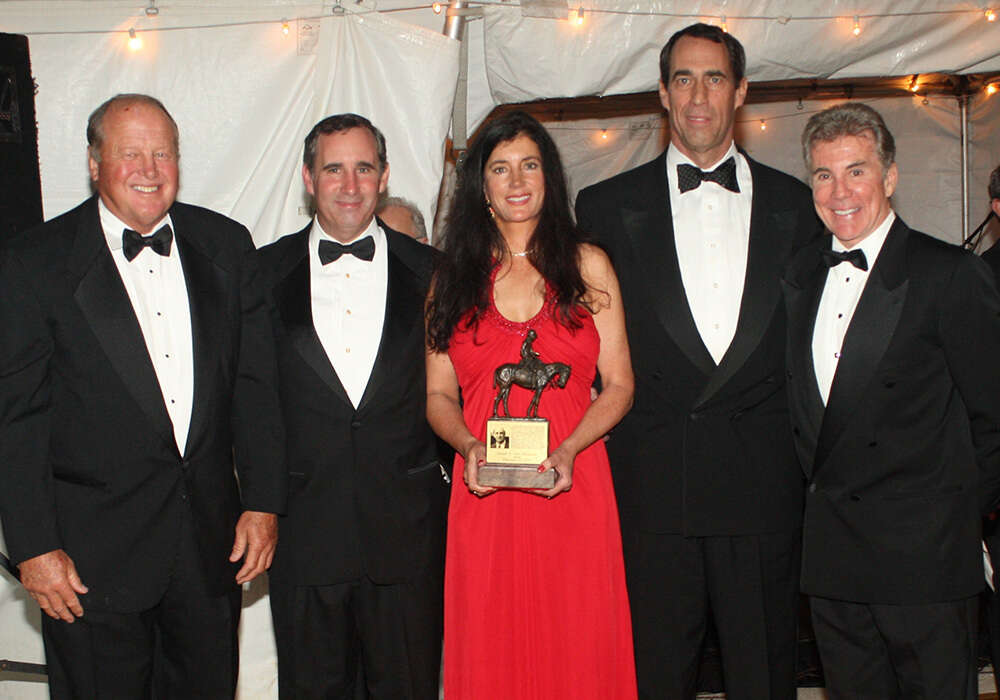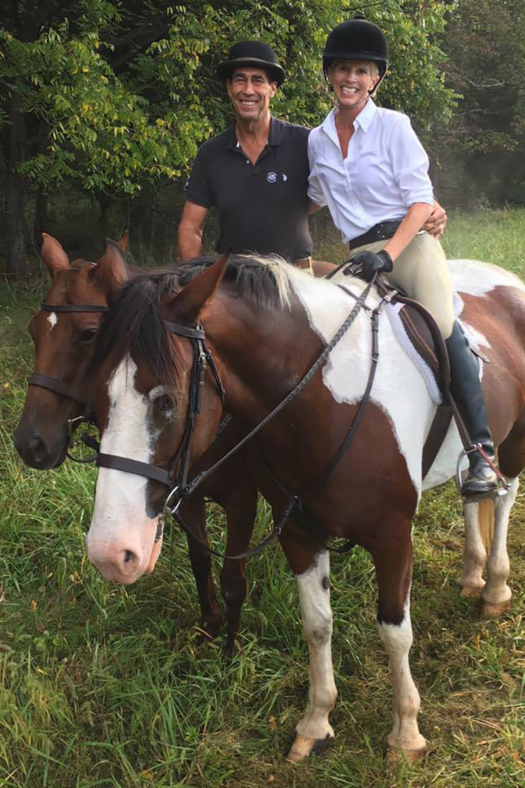Formerly one of the highest-rated amateurs in polo at 5-goals, USPA Eastern Circuit Governor Joe Muldoon has tried a multitude of equestrian sports, from foxhunting and steeplechase racing to show jumping and dressage, his athleticism and versatility impressive at 6 feet 5 inches tall. Born in the nation’s capital of Washington D.C. and raised in Poolesville, Maryland, Muldoon grew up immersed in his family’s equestrian way of life, naturally gravitating to adrenaline-filled disciplines before his father’s venture into polo captured his full attention. Playing intermittently during summers and time off throughout college, his skill and love for the game grew as he traveled across the United States and overseas to South America, Europe and Australia. Receiving a Juris Doctor degree from his father’s alma mater, Georgetown University Law Center, Joe began his law career on Capitol Hill as an Associate Counsel for the Committee on Agriculture of the United States House of Representatives, all the while maintaining his connection with the sport.
Practicing legislative law and government relations on behalf of multi-national agribusiness and later transportation interests for much of his career, Muldoon is distinguished by his friendly disposition and warm smile. Looking for a change from the increasingly strident daily politics in Washington, Muldoon transitioned into helping clients with their real estate goals in 2012 and he enjoys a vibrant life outside of the office with his wife Ashley and their children. Participating in a variety of sports, Muldoon remains an active skier and wind surfer and still wants to learn new activities such as snowboarding and kite surfing. Accustomed and genuinely concerned with representing the interests of others, Muldoon serves the USPA membership on the finance, constitution and Team USPA Committees. Alongside his younger siblings, Charlie Muldoon, Executive Director of Umpires LLC, and his sister Mary, the Muldoon family is actively carrying on the legacy of their father ‘Big Joe.’
What is your equestrian background and how did you become involved in polo?
“My father was a life-long trainer of horses for show jumping and foxhunting and as a result I’ve ridden my entire life. I won my first leadline class when I was 18 months old and I began foxhunting on a leadline when I was just four. I rode in pony club, participated in gymkhanas and three phase events, and I also competed in horse shows and ran steeplechase races into my teenage years. Around that time my father finally bought his first polo pony and I was hooked and immediately became addicted to the game. Imagine, at the time I loved playing football, but here was a contact sport that you could play on horseback! This sport was made for me.
My mom was also a horse person and she did a lot of high-level dressage. Her trainer was former Russian Olympian Jonas Irbinskas. At a young age I thought I was a pretty good rider, but she convinced me to take a lesson with him. At the time I didn’t really believe that I needed dressage lessons. I had always considered dressage as the boring part of being a pony clubber that we had to get through so we could do the fun stuff like jumping, but riding with Jonas really helped me as a rider and opened my eyes to a more precise way of riding and communicating with the horse.
One of my favorite memories of playing polo with my family is winning the National 8-Goal Association Cup in 1983 for Gone Away Farm with my father, Charlie and Mary at Potomac Polo Club.”

Joe and Ashley Muldoon attend a benefit charity polo match.
“I’ve played polo since the early 1970s and it has given me so much happiness and joy throughout my life. Through becoming a Circuit Governor I really wanted to have the opportunity to give something back to the sport and help it improve.” – Joe Muldoon
How did your love for polo influence your career path?
“I always hoped and assumed that my life would continue to be filled with horses. When I first entered college at Cornell University, I had originally planned to go on to veterinary school after graduation. I thought that it would give me the lifestyle that I wanted. After transferring to the University of Arizona, I interned one summer for a top horse vet, foxhunter and polo player named Dr. G. Marvin Beeman, DVM, in Colorado who was at that time the head of the American Association of Equine Practitioners, and one of the top veterinarians in the country. He seemed to have what I wanted to achieve, but he opened my eyes to ways in which the vet industry had changed and I decided that I should choose another path to support my polo habit.
I eventually applied and was accepted into Georgetown University Law School and I was fortunate to land a job on Capitol Hill right out of law school. Living on a farm within commuting distance from Washington, D.C. allowed me to develop my career in federal government relations while being able to continue to ride and play polo in the evenings and on weekends.”
Who inspired you at the start of your polo career?
“When I was 16, I met Jim McGinley, a 7-goal polo player from New Zealand, when he came to Potomac Polo Club as a guest of the owner, Tommy Dowd. He was a total horseman and I was always impressed by the way that he trained, cared for, and prepared his fine string of Thoroughbred mares. He even did his own shoeing and floated their teeth.
Jimmy was scheduled to play later in the summer on a team with Dr. Billy Linfoot in the U.S. Open Polo Championship® and he invited me to come along to watch and help out. It was an amazing experience to see high-goal polo for the first time and I had the opportunity to watch and meet some of the great players of the day including Billy Linfoot, Cecil Smith, Roy and Joe Barry, and others. I returned home even more inspired.”
“During my first brief visit to Argentina, I met a nice gentleman who invited me to return and play polo there for three months. He provided me with an apartment in the middle of Recoleta, Buenos Aires, a car to drive, membership in the Jockey Club, 20 horses to choose from and the opportunity to play polo four days a week including some 20-goal tournaments. This helped my polo tremendously and I brought home four new horses which helped even more!”
Why did you decide to start a polo school at the Potomac Polo Club?
“When my father first got involved in polo in the early 1970s he played at Potomac Polo Club, which at the time was the only polo club in the state of Maryland. The facilities included a single field and a huge arena, both located on owner Thomas Dowd’s farm near Potomac where Friday night polo under the lights had become a social tradition. Unfortunately, just as my family was getting more and more interested in the game, many of the club players, including the owner, were starting to age out and retire. In 1978 with an impending development planned for the old facility, my father stepped up and provided new grounds for the club 10 miles further out in the country.
For all of these reasons, the club was decreasing in membership and had gotten down to less than 10 active members. I was worried we would not have enough people to play so I decided to start teaching in 1978 and created the Potomac Polo School. All that was required was for you to bring your boots and helmet and the school would provide everything else. Over time I put together a string of lesson horses made up of a few retired polo ponies, a few quiet quarter horses which were borrowed or boarded at home, plus a few more solid horses from the local auction.
When I went to law school, I passed the polo school on to my brother Charlie and my sister Mary after him, but now they each have their own operations. Charlie instructs at Summerhill Polo and Mary teaches at Red Eagle Polo Club. After 40 years, we are still introducing new folks to polo every summer.”

Joe (second from right), Charlie and Mary attend their father’s 2010 induction ceremony into the Polo Hall of Fame. Pictured with Steve Orthwein and John Walsh. ©Alex Pacheco/Museum of Polo Archives
Tell us about the Muldoon family’s efforts to support charities through polo?
“The Muldoon family has a long tradition of supporting charities through polo. Over 30 years ago my father and Christian Zimmerman, the former chair of the Argentine Polo Association, created an annual high-goal charity match played by some of the best players in the world. They volunteered to play in order to raise money to support the Spinal Cord Research Foundation, the Washington Hospital Center and other groups at the Potomac Polo Club. The annual Washington International All-Star Match was an amazing and well attended event which kicked off with a black-tie gala held the night before in downtown Washington D.C. and included amazing 30-goal and up polo. This match featured many of the best players in the world at that time including brothers Juan Carlos and Alfredo Harriott, Gonzalo Pieres Sr. and Eddie Moore.
Another charitable organization, Family House, located in Pittsburgh, Pennsylvania, heard of our success with our event and asked us to help consult and advise them in establishing a polo charity match of their own. We soon had committed to bringing two teams to play the only game in Pittsburgh on the second weekend in September. 2019 will be my thirty-sixth year of playing in the annual Family House Polo Charity Match. Family House is a wonderful charity that provides housing for families of patients undergoing long-term medical operations, transplants and other procedures. We’ve helped raise millions of dollars for Family House and I’ve played in all 35 matches. It’s my favorite kind of polo and I plan my year around it. What can be better than helping others while doing something you love?!”
What have you accomplished for the Eastern Circuit that you are most proud of?
“The Association has enacted many changes to its rules, bylaws, policies and other regulations in recent years. Needless to say this amount of legislating can often lead to misunderstandings, misconceptions or unintended consequences which may negatively or unfairly affect one or more of our clubs or playing members. I enjoy trying to help my members find their way through the bureaucracy in order to reach their goals and find real value from the USPA, whether it is holding successful tournaments, qualifying for financial assistance or amending undesirable regulations.
Much of my effort during my first term as Circuit Governor was spent focusing on and supporting issues that are broader in scope and affect many other circuits as well. During this time, the USPA has implemented big changes in its leadership, programs and policies. As an example, lowering of the handicap level of our elite high-goal tournaments to 22-goals has energized those tournaments, improved the polo and provided more opportunities for young American players to play at that level. Anyone who played in or watched the games in the U.S. Open Polo Championship® this past winter can attest to how much the polo has improved.
The rules continue to be adjusted to improve the competitiveness, speed and safety of the game. New tournament conditions are being used to experiment with and phase in new rules and approaches. I’m proud of the initiatives we’ve put into place to improve the safety, attractiveness and accessibility of polo for everyone.”

Joe and his wife both enjoy riding as a hobby.
Why are you passionate about polo in comparison to all the other equestrian disciplines you’ve participated in?
“Many of the other horse sports have some of the same elements of polo. For example there’s nothing like the adrenaline rush of galloping down to the first fence of a steeplechase race, but polo combines more elements than any other sport all in one. For me anything on a horse is wonderful, but polo provides mental, physical and emotional stimulation like no other sport. Horsemanship is key as your effectiveness is based on both the quality of your horses and your ability to communicate with them. Most equestrian sports require individual performances, but polo incorporates the team aspect which I really enjoy having played team sports my whole life. In addition, polo is one of the few sports on horseback where it’s not a disadvantage to be as tall as I am!”
If you would like to contact Joe about your club he can be reached at jamuldoon@aol.com.POTOMAC POLO CLUB
